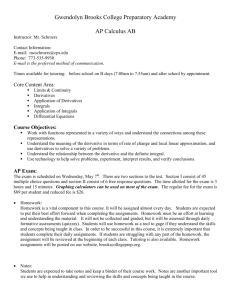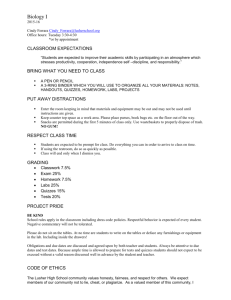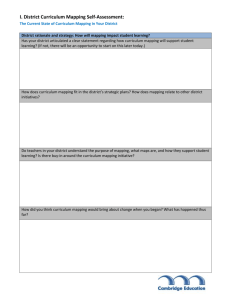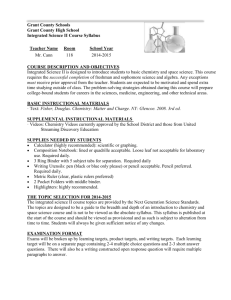Course Outline - Grand Erie District School Board
advertisement
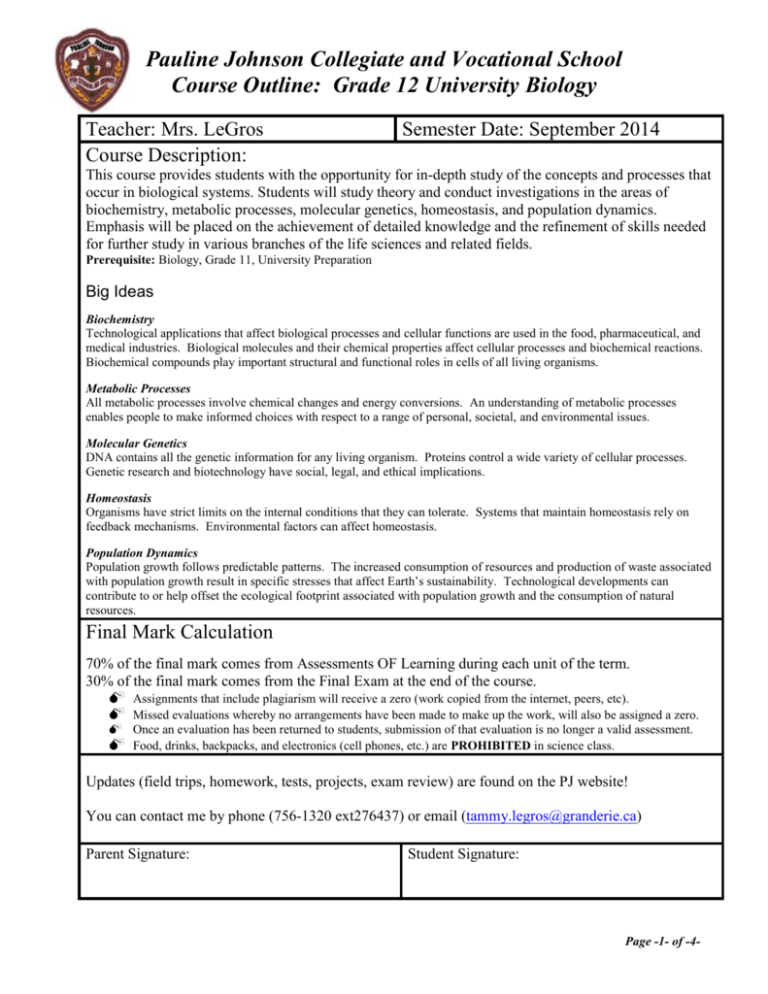
Pauline Johnson Collegiate and Vocational School Course Outline: Grade 12 University Biology Teacher: Mrs. LeGros Course Description: Semester Date: September 2014 This course provides students with the opportunity for in-depth study of the concepts and processes that occur in biological systems. Students will study theory and conduct investigations in the areas of biochemistry, metabolic processes, molecular genetics, homeostasis, and population dynamics. Emphasis will be placed on the achievement of detailed knowledge and the refinement of skills needed for further study in various branches of the life sciences and related fields. Prerequisite: Biology, Grade 11, University Preparation Big Ideas Biochemistry Technological applications that affect biological processes and cellular functions are used in the food, pharmaceutical, and medical industries. Biological molecules and their chemical properties affect cellular processes and biochemical reactions. Biochemical compounds play important structural and functional roles in cells of all living organisms. Metabolic Processes All metabolic processes involve chemical changes and energy conversions. An understanding of metabolic processes enables people to make informed choices with respect to a range of personal, societal, and environmental issues. Molecular Genetics DNA contains all the genetic information for any living organism. Proteins control a wide variety of cellular processes. Genetic research and biotechnology have social, legal, and ethical implications. Homeostasis Organisms have strict limits on the internal conditions that they can tolerate. Systems that maintain homeostasis rely on feedback mechanisms. Environmental factors can affect homeostasis. Population Dynamics Population growth follows predictable patterns. The increased consumption of resources and production of waste associated with population growth result in specific stresses that affect Earth’s sustainability. Technological developments can contribute to or help offset the ecological footprint associated with population growth and the consumption of natural resources. Final Mark Calculation 70% of the final mark comes from Assessments OF Learning during each unit of the term. 30% of the final mark comes from the Final Exam at the end of the course. Assignments that include plagiarism will receive a zero (work copied from the internet, peers, etc). Missed evaluations whereby no arrangements have been made to make up the work, will also be assigned a zero. Once an evaluation has been returned to students, submission of that evaluation is no longer a valid assessment. Food, drinks, backpacks, and electronics (cell phones, etc.) are PROHIBITED in science class. Updates (field trips, homework, tests, projects, exam review) are found on the PJ website! You can contact me by phone (756-1320 ext276437) or email (tammy.legros@granderie.ca) Parent Signature: Student Signature: Page -1- of -4- Pauline Johnson Collegiate and Vocational School Course Outline: Grade 12 University Biology Unit One: BIOCHEMISTRY Key Expectations/ Essential Learning Goals: demonstrate scientific investigation skills (related to both inquiry and research) in the four areas of skills (initiating and planning, performing and recording, analysing and interpreting, and communicating); identify and describe careers related to the fields of science under study, and describe contributions of scientists, including Canadians, to those fields. analyse technological applications of enzymes in some industrial processes, and evaluate technological advances in the field of cellular biology; investigate the chemical structures, functions, and chemical properties of biological molecules involved in some common cellular processes and biochemical reactions; demonstrate an understanding of the structures and functions of biological molecules, and the biochemical reactions required to maintain normal cellular function. Assessments OF Learning (Evaluations) Activities: (Assessments For & As Learning) Lab investigations, activities, and research topics related to course material; as well as quizzes on specific content may include: Demonstration of Enzyme Activity Structural Diagrams of Macromolecules Comparing Synthesis and Hydrolysis Analyzing Functions of Nutrients Various text book questions for daily homework assignments will be given out for practice. Properties of Water Lab Factors Affecting Enzymes Chapter 1 Test Unit Two: METABOLIC PROCESSES Key Expectations/ Essential Learning Goals: demonstrate scientific investigation skills (related to both inquiry and research) in the four areas of skills (initiating and planning, performing and recording, analysing and interpreting, and communicating); identify and describe careers related to the fields of science under study, and describe contributions of scientists, including Canadians, to those fields. analyse the role of metabolic processes in the functioning of biotic and abiotic systems, and evaluate the importance of an understanding of these processes and related technologies to personal choices made in everyday life; investigate the products of metabolic processes such as cellular respiration and photosynthesis; demonstrate an understanding of the chemical changes and energy conversions that occur in metabolic processes. Assessments OF Learning (Evaluations) Fermentation Lab Cellular Respiration Test Photosynthesis Test Activities: (Assessments For & As Learning) Lab investigations, activities, and research topics related to course material; as well as quizzes on specific content may include: Demonstration of CO2 Production Metabolic Pathways Poster Comparing Aerobic and Anaerobic Respiration Analyzing Pigment Composition Various text book questions for daily homework assignments will be given out for practice. Page -2- of -4- Pauline Johnson Collegiate and Vocational School Course Outline: Grade 12 University Biology Unit Three: MOLECULAR GENETICS Key Expectations/ Essential Learning Goals: demonstrate scientific investigation skills (related to both inquiry and research) in the four areas of skills (initiating and planning, performing and recording, analysing and interpreting, and communicating); identify and describe careers related to the fields of science under study, and describe contributions of scientists, including Canadians, to those fields. analyse some of the social, ethical, and legal issues associated with genetic research and biotechnology; investigate, through laboratory activities, the structures of cell components and their roles in processes that occur within the cell; demonstrate an understanding of concepts related to molecular genetics, and how genetic modification is applied in industry and agriculture. Assessments OF Learning (Evaluations) Biotechnology Report Genetics Test Activities: (Assessments For & As Learning) Lab investigations, activities, and homework assignments related to course material. Quizzes on various topics. Possible assessments: Comparing DNA and RNA Isolating DNA from Cells Transcribing and Translating the Code Various text book questions for daily homework assignments will be given out for practice. Unit Four: HOMEOSTASIS Key Expectations/ Essential Learning Goals: evaluate the impact on the human body of selected chemical substances and of environmental factors related to human activity; investigate the feedback mechanisms that maintain homeostasis in living organisms; demonstrate an understanding of the anatomy and physiology of human body systems, and explain the mechanisms that enable the body to maintain homeostasis. Assessments OF Learning (Evaluations) Urinalysis Lab Vision and Hearing Lab Independent Investigation Unit Test (2 parts) Activities: (Assessments For & As Learning) Lab investigations, activities, and homework assignments related to course material. Quizzes on various topics. Possible assessments: Kidney Dissection Brain Dissection Eye Dissection Various text book questions for daily homework assignments will be given out for practice. Page -3- of -4- Pauline Johnson Collegiate and Vocational School Course Outline: Grade 12 University Biology Unit Five: POPULATION DYNAMICS Key Expectations/ Essential Learning Goals: analyze the relationships between population growth, personal consumption, technological development, and our ecological footprint, and assess the effectiveness of some Canadian initiatives intended to assist expanding populations; investigate the characteristics of population growth, and use models to calculate the growth of populations within an ecosystem; demonstrate an understanding of concepts related to population growth, and explain the factors that affect the growth of various populations of species. Assessments OF Learning (Evaluations) Estimating Population Size Unit Test Activities: (Assessments For & As Learning) Lab investigations, activities, and homework assignments related to course material. Quizzes on various topics. Possible assessments: Population Growth Calculations Modeling Relationships Population Growth Study Various text book questions for daily homework assignments will be given out for practice. Page -4- of -4-


